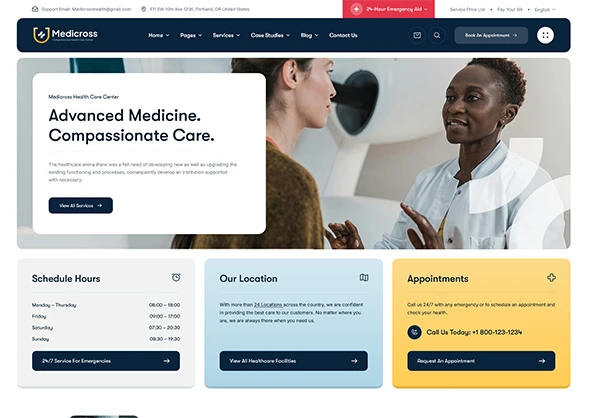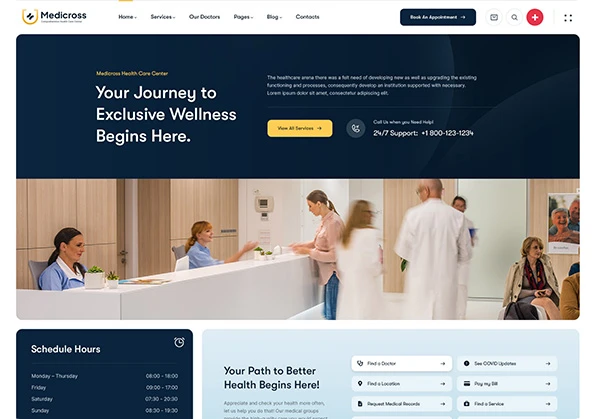- Your cart is empty Browse Shop
Doctors manage diabetes and thyroid with regular monitoring, medication, lifestyle guidance, and personalized care to ensure balanced health and prevention.
Our Approach to Diabetes & Thyroid
The hospital approach to managing diabetes and thyroid disorders is multidisciplinary, systematic, and patient-focused, aiming to control symptoms, prevent complications, and improve quality of life. These endocrine conditions are chronic and often interrelated, requiring accurate diagnosis, individualized treatment, and ongoing monitoring by healthcare professionals including endocrinologists, internists, nurses, dietitians, and diabetes educators.
Diabetes management in a hospital starts with a comprehensive assessment of the patient’s blood sugar levels, HbA1c, medical history, symptoms, lifestyle, and potential complications. Based on these findings, an individualized care plan is developed. For patients with high or uncontrolled blood glucose, immediate interventions may include insulin therapy, intravenous fluids, and correction of electrolyte imbalances. Long-term diabetes care focuses on blood sugar regulation through a combination of insulin or oral medications, medical nutrition therapy, exercise plans, and regular glucose monitoring. Hospitals also provide diabetes education programs that teach patients how to manage their condition independently, recognize warning signs, and avoid complications such as neuropathy, kidney failure, or diabetic foot ulcers.
Thyroid disorders, including hypothyroidism, hyperthyroidism, thyroid nodules, and thyroid cancer, are also addressed through a structured hospital-based approach. Initial evaluation involves clinical examination and laboratory tests such as TSH, T3, T4, thyroid antibodies, and sometimes imaging studies like ultrasound or thyroid scans. Treatment depends on the specific condition. For hypothyroidism, levothyroxine replacement therapy is the standard treatment, while hyperthyroidism may require anti-thyroid medications, radioactive iodine therapy, or in some cases, thyroidectomy (surgery). In thyroid cancer cases, hospitals offer advanced diagnostic services and oncology support, including surgical removal and radioactive iodine treatment, followed by hormone replacement.
Hospitals ensure integrated care by bringing together specialists from various fields to address co-existing issues. Many diabetic patients also suffer from thyroid imbalances, so screening for both conditions is a routine part of endocrine evaluations. Inpatients with diabetes or thyroid disorders are monitored closely for fluctuations that may affect recovery from surgery, infection, or acute illnesses. Endocrinologists work in coordination with surgeons, cardiologists, nephrologists, and other departments to ensure comprehensive and safe treatment.
Another key aspect of the hospital approach is patient education and follow-up care. Educators help patients understand their medications, the importance of lifestyle changes, and how to manage their condition at home. Nutritional guidance is provided by dietitians who customize meal plans based on the patient’s needs. Psychological support is also available to help patients cope with the emotional stress that often accompanies chronic endocrine disorders.
In summary, the hospital approach to diabetes and thyroid care is based on early diagnosis, personalized treatment plans, interdepartmental collaboration, and patient empowerment. This ensures not only the control of symptoms and prevention of complications but also promotes long-term health, independence, and a better quality of life for patients living with these conditions.
Primary Care
Primary care of diabetes and thyroid disorders in a hospital setting focuses on early identification, prompt treatment, patient education, and long-term management to prevent complications. These endocrine conditions are common, chronic, and often interconnected. Hospitals play a vital role in providing comprehensive, patient-centered care through multidisciplinary collaboration involving primary care physicians, endocrinologists, nurses, dietitians, and diabetes educators.
For diabetes, primary care begins with screening and diagnosis. Patients with symptoms such as frequent urination, excessive thirst, fatigue, or unexplained weight loss are tested using fasting blood glucose, HbA1c, or oral glucose tolerance tests. Once diagnosed, the hospital team assesses the patient’s overall health, lifestyle, comorbidities, and risk factors to create an individualized treatment plan. In cases of severe hyperglycemia or diabetic emergencies like ketoacidosis, immediate stabilization with insulin, fluids, and electrolyte correction is performed.
Long-term primary care for diabetes in hospitals includes blood sugar monitoring, medication management (such as insulin or oral hypoglycemics), and regular assessments for complications like neuropathy, retinopathy, and kidney disease. Equally important is patient education, where individuals are taught to manage their condition through diet, exercise, glucose testing, and adherence to medication. Nutritionists guide patients on carbohydrate counting and balanced eating, while nurses or diabetes educators instruct on insulin injection techniques and foot care. Mental health support is also offered to address stress, depression, or anxiety often linked to chronic illness.
In the case of thyroid disorders, primary care in hospitals also starts with clinical evaluation and blood tests for thyroid-stimulating hormone (TSH), T3, and T4 levels. Hypothyroidism (underactive thyroid) and hyperthyroidism (overactive thyroid) are the most common disorders. Hypothyroidism is typically managed with levothyroxine, while hyperthyroidism may be treated with anti-thyroid drugs, beta-blockers, or referred for further treatment such as radioactive iodine therapy or surgery.
For both conditions, the hospital’s role in early detection is critical, especially for patients admitted for unrelated issues where symptoms like fatigue, weight changes, or heart irregularities may reveal underlying endocrine problems. Moreover, thyroid disorders can affect other health systems, especially in pregnant women, children, and elderly patients, making prompt diagnosis and treatment in hospital settings essential.
Hospitals also provide care for patients with coexisting diabetes and thyroid problems, which are often linked, especially in autoimmune conditions like Hashimoto’s thyroiditis or Graves’ disease. Coordinated care ensures that treatment of one condition doesn’t negatively impact the other, especially with regard to medication interactions or symptom overlap.
In conclusion, the primary care of diabetes and thyroid in a hospital is a blend of early diagnosis, continuous monitoring, patient education, and multidisciplinary support. The focus is on stabilizing the patient’s condition, teaching self-management skills, and preventing long-term complications. By addressing both the medical and lifestyle aspects of these disorders, hospitals empower patients to lead healthier, more balanced lives.
Why Choose Our Hospital?
Experience and Expertise
Diabetes and Thyroid Specialist
Patient Focused
Honesty and Integrity
Reasonable Treatment
Are you having health problems? Contact us for take appointment
Addres
102/A, O.R. Nizam Road, Panchlaish, Chittagong, Bangladesh.
Contact With Us
Mail Us: info@greencityhospitalbd.com
Call Us 24/7: 01336-359001
Call Us 24/7: 01336-359001
Working Time
Opening Hours
Saturday-Friday: 7.00am – 12.00am
Saturday-Friday: 7.00am – 12.00am








